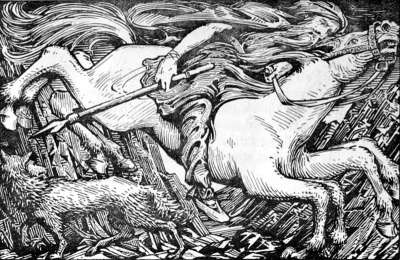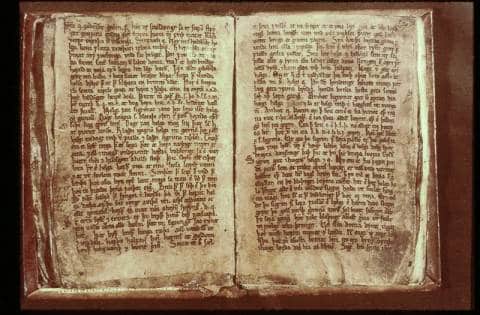To understand the controversy surrounding the poem Vegtamskvida (The Lay of Vegtam), you need to go to the sources. As can be expected after hundreds of years have passed, there are sometimes slight variations in old texts. This is the case with the short poem “Baldrs Draumar” and the slightly longer poem “Vegtamskvida”.
The sources for the different versions of “Baldr’s Draumar”
The poem “Baldrs Draumar” is only found in one ancient manuscript, known as AM 748 I 4to dated 1300-1325. This manuscript contains only six poems, where all except Baldrs Draumar, are also found in the much larger Codex Regius.
The latter manuscript, the Codex Regius, is basically the cornerstone manuscript of all Old Norse mythology. It was written in Iceland around 1270 and is a collection of 29 poems from mythology and old heroes’ tales.
When scholars try to distinguish between what is truly old Norse mythology and what might have originated in the 15th and 16th century, for example, the Codex Regius is a source of the “truth”.
Vegtamskvida in Edda Oblongata
The Vegtamskvida, or the “longer” version of Baldrs Draumar, falls into this category. The paper manuscripts where it is found, dates from the 17th century, and are by several scholars disregarded. The first instance where Vegtamskvida is found is in the “Edda Oblongata”, an Icelandic manuscript from 1680. It’s called -oblongata (Long) because of its peculiar, long rectangular shape. It has some really cool images of the gods, Yggdrasil and more so I recommend having a look!
In it, the Baldrs Draumar poem is called Vegtamskvida and it has grown into twenty verses from its original 14. It picks up four of the verses between the older Baldrs Draumar verse 1 and 2. The addition of extra lines and slightly different structure in a few verses makes it come to twenty in total.
However, just being a later manuscript I feel shouldn’t lessen its potential authenticity as a source of Old Norse poems. There are several poems in it that are also found in the Prose- and Poetic Edda that, as I understand it, stay true to their origins. What is real or not shouldn’t only be judged by the age of the manuscript it is found.
I have reflected on this in some other posts, maybe especially in one discussing Old Norse symbols, real and invented. Both symbols and poems were passed down over hundreds of years orally, by many different people, spread over large distances. That there are variations, parts omitted or forgotten, and other parts included is to be expected.
We should approach all the older texts with curiosity and also remember that they have survived hundreds of years of book-burning, wars, weather, fires and general disregard in some cases.
Vegtamskvida – The Lay of Vegtam
The following poem is an adaptation of a translation by Benjamin Thorpe. It is dated to 1865 and I have only modernized the English and made slight changes where the sentence structure was really outdated.

- The Æsir were all in council and the Asynjur in the conference. They consulted, the mighty gods, about why Baldr had depressive dreams.
- His sleep was not well; his horrible dreams made him increasingly worried. They questioned the Jötuns, wise seers of the future, whether this was a warning of grief to come.
- The Jötuns said that Baldr was destined for death, of all the dearest: that caused grief to Frigg and Svafnir (Odin), and to the other Aesir. They decided on a course.
- They would ask of every being, a promise to never cause Baldr any harm. All species swore oaths to spare him; Frigg received all their vows.
- Odin still feared something was wrong, he worried the Norns may have decided; he convenes the Æsir to get their counsel, at the deliberation they set on a plan.
- Odin rose, lord of men and he saddled Sleipnir; then he rode down to Niflhel. There he met a dog that came from Hel.
- It was blood-stained on its breast, its slaughter-craving throat, and lower jaw. It bayed and widely gaped at the sire of the magic song (Odin):—long it howled.
- Odin rode on—the ground rattled—until he came to Hel’s lofty house. Then Odin rode to the eastern gate, where he knew there was a völva’s grave.
- Over the prophetess, he began to chant a magic song, looking towards the north, using powerful runes, he said a spell, and demanded an answer, until compelled she rose, and with a deathlike voice she said:
The völva spoke:
10. “What man is this, to me unknown, who has for me increased an irksome course? I have with snow been decked, by rain beaten, and with dew moistened: long have I been dead.”
Vegtam spoke:
11. “Vegtam is my name, I am Valtam’s son. Tell me you of Hel: from, earth I visit you. For whom are those benches strewed over with rings, those costly couches overlaid with gold?”
The völva spoke:
12. “Here stands mead, for the cursed Baldr, over the bright potion a shield is laid; but the Æsir race is in despair. I was compelled to speak; I will now be silent.”
Vegtam spoke:
13. “Be not silent, völva! I will question thee, until I know all. I will yet know who will be Baldr’s slayer, and take the life of Odin’s son.”
The völva spoke
14. “Hödr will send his glorious brother, he of Baldr will the slayer be, and Odin’s son of life bereave. I was compelled to speak; I will now be silent.”
Vegtam spoke:
15. “Be not silent, völva! I will question thee, until I know all. I will yet know who on Hödr vengeance will inflict, or Baldr’s slayer raise on the pile.”
The völva spoke:
16. “A son of Rind shall be born in the western halls; he shall slay Odin’s son when he is only one night old. He will not wash his hands or comb his hair before he carries Baldr’s adversary to the pile. I was compelled to speak; I will now be silent.”
Vegtam spoke:
17. “Do not remain silent, völva! I will question you until I know everything. I want to know who are the maidens that weep at will and throw their neck-veils towards the sky? Tell me that: otherwise you shall not rest.”
The völva spoke:
18. “You are not Vegtam, as I thought before; you are Odin, lord of men!”
Odin spoke:
19. “You are not a völva, nor a wise woman, you are the mother of three Jotnar.”
The völva spoke:
20. “Ride home, Odin! and be proud. No man shall visit me again until Loki is freed from his bonds and Ragnarok begins.”
Aftermath Of The Vegtamskvida
As you might know very well, the events that were prophesied happened just as the völva had said. The always wiley and untrustworthy Loki tricked Hödr to throw a spear made from mistletoe, killing Baldur.
This can be said to set off the events leading to Ragnarök. It is the vengeful Loki and his infamous children that finally leads the charge on the Asgardians. As a poetic twist of fate, Odin rides Sleipnir into battle to meet the Fenrir wolf. Both Sleipnir as well as Fenrir are children of Loki.
Featured Image Credit: Lorenz Frølich, Public domain, via Wikimedia Commons

